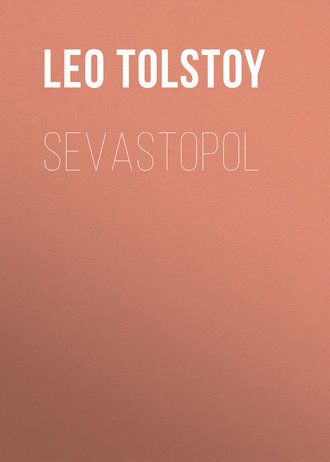
Лев Толстой
Sevastopol
II
As he entered the street of the ruined remains of the stone wall, forming the Tatar houses of Duvanka, Lieutenant Kozeltzoff was stopped by a transport of bombs and grape-shot, which were on their way to Sevastopol, and had accumulated on the road. Two infantry soldiers were seated in the dust, on the stones of a ruined garden-wall by the roadside, devouring a watermelon and bread.
“Have you come far, fellow-countryman?” said one of them, as he chewed his bread, to the soldier, with a small knapsack on his back, who had halted near them.
“I have come from my government to join my regiment,” replied the soldier, turning his eyes away from the watermelon, and readjusting the sack on his back. “There we were, two weeks ago, at work on the hay, a whole troop of us; but now they have drafted all of us, and we don't know where our regiment is at the present time. They say that our men went on the Korabelnaya last week. Have you heard anything, gentlemen?”
“It's stationed in the town, brother,” said the second, an old soldier of the reserves, digging away with his clasp-knife at the white, unripe melon. “We have just come from there, this afternoon. It's terrible, my brother!”
“How so, gentlemen?”
“Don't you hear how they are firing all around to-day, so that there is not a whole spot anywhere? It is impossible to say how many of our brethren have been killed.” And the speaker waved his hand and adjusted his cap.
The passing soldier shook his head thoughtfully, gave a clack with his tongue, then pulled his pipe from his boot-leg, and, without filling it, stirred up the half-burned tobacco, lit a bit of tinder from the soldier who was smoking, and raised his cap.
“There is no one like God, gentlemen! Good-bye,” said he, and, with a shake of the sack on his back, he went his way.
“Hey, there! you'd better wait,” said the man who was digging out the watermelon, with an air of conviction.
“It makes no difference!” muttered the traveller, threading his way among the wheels of the assembled transports.
III
The posting-station was full of people when Kozeltzoff drove up to it. The first person whom he encountered, on the porch itself, was a thin and very young man, the superintendent, who continued his altercation with two officers, who had followed him out.
“It's not three days only, but ten that you will have to wait. Even generals wait, my good sirs!” said the superintendent, with a desire to administer a prick to the travellers; “and I am not going to harness up for you.”
“Then don't give anybody horses, if there are none! But why furnish them to some lackey or other with baggage?” shouted the elder of the two officers, with a glass of tea in his hand, and plainly avoiding the use of pronouns,10 but giving it to be understood that he might very easily address the superintendent as “thou.”
“Judge for yourself, now, Mr. Superintendent,” said the younger officer, with some hesitation. “We don't want to go for our own pleasure. We must certainly be needed, since we have been called for. And I certainly shall report to the general. But this, of course, – you know that you are not paying proper respect to the military profession.”
“You are always spoiling things,” the elder man interrupted, with vexation. “You only hinder me; you must know how to talk to them. Here, now, he has lost his respect. Horses this very instant, I say!”
“I should be glad to give them to you, bátiushka,11 but where am I to get them?”
After a brief silence, the superintendent began to grow irritated, and to talk, flourishing his hands the while.
“I understand, bátiushka. And I know all about it myself. But what are you going to do? Only give me” – here a ray of hope gleamed across the faces of the officers – “only give me a chance to live until the end of the month, and you won't see me here any longer. I'd rather go on the Malakhoff tower, by Heavens! than stay here. Let them do what they please about it! There's not a single sound team in the station this day, and the horses haven't seen a wisp of hay these three days.” And the superintendent disappeared behind the gate.
Kozeltzoff entered the room in company with the officers.
“Well,” said the elder officer, quite calmly, to the younger one, although but a second before he had appeared to be greatly irritated, “we have been travelling these three weeks, and we will wait a little longer. There's no harm done. We shall get there at last.”
The dirty, smoky apartment was so filled with officers and trunks that it was with difficulty that Kozeltzoff found a place near the window, where he seated himself; he began to roll himself a cigarette, as he glanced at the faces and lent an ear to the conversations.
To the right of the door, near a crippled and greasy table, upon which stood two samovárs, whose copper had turned green in spots, here and there, and where sugar was portioned out in various papers, sat the principal group. A young officer, without moustache, in a new, short, wadded summer coat, was pouring water into the teapot.
Four such young officers were there, in different corners of the room. One of them had placed a cloak under his head, and was fast asleep on the sofa. Another, standing by the table, was cutting up some roast mutton for an officer without an arm, who was seated at the table.
Two officers, one in an adjutant's cloak, the other in an infantry cloak, a thin one however, and with a satchel strapped over his shoulder, were sitting near the oven bench, and it was evident, from the very way in which they stared at the rest, and from the manner in which the one with the satchel smoked his cigar, that they were not line officers on duty at the front, and that they were delighted at it.
Not that there was any scorn apparent in their manner, but there was a certain self-satisfied tranquillity, founded partly on money and partly on their close intimacy with generals, a certain consciousness of superiority which even extended to a desire to hide it.
A thick-lipped young doctor and an officer of artillery, with a German cast of countenance, were seated almost on the feet of the young officer who was sleeping on the sofa, and counting over their money.
There were four officers' servants, some dozing and others busy with the trunks and packages near the door.
Among all these faces, Kozeltzoff did not find a single familiar one; but he began to listen with curiosity to the conversation. The young officers, who, as he decided from their looks alone, had but just come out of the military academy, pleased him, and, what was the principal point, they reminded him that his brother had also come from the academy, and should have joined recently one of the batteries of Sevastopol.
But the officer with the satchel, whose face he had seen before somewhere, seemed bold and repulsive to him. He even left the window, and, going to the stove-bench, seated himself on it, with the thought that he would put the fellow down if he took it into his head to say anything. In general, purely as a brave “line” officer, he did not like “the staff,” such as he had recognized these two officers to be at the first glance.
IV
“But this is dreadfully annoying,” said one of the young officers, “to be so near, and yet not be able to get there. Perhaps there will be an action this very day, and we shall not be there.”
In the sharp voice and the mottled freshness of the color that swept across the youthful face of this officer as he spoke there was apparent the sweet young timidity of the man who is constantly afraid lest his every word shall not turn out exactly right.
The one-armed officer glanced at him with a smile.
“You will get there soon enough, I assure you,” he said.
The young officer looked with respect at the haggard face of the armless officer, so unexpectedly illuminated by a smile, held his peace for a while, and busied himself once more with his tea. In fact, the one-armed officer's face, his attitude, and, most of all, the empty sleeve of his coat, expressed much of that tranquil indifference that may be explained in this way – that he looked upon every conversation and every occurrence as though saying, “That is all very fine; I know all about that, and I can do a little of that myself, if I only choose.”
“What is our decision to be?” said the young officer again to his companion in the short coat. “Shall we pass the night here, or shall we proceed with our own horses?”
His comrade declined to proceed.
“Just imagine, captain,” said the one who was pouring the tea, turning to the one-armed man, and picking up the knife that the latter had dropped, “they told us that horses were frightfully dear in Sevastopol, so we bought a horse in partnership at Simferopol.”
“They made you pay pretty high for it, I fancy.”
“Really, I do not know, captain; we paid ninety rubles for it and the team. Is that very dear?” he added, turning to all the company, and to Kozeltzoff, who was staring at him.
“It was not dear, if the horse is young,” said Kozeltzoff.
“Really! but they told us that it was dear. Only, she limps a little, but that will pass off. They told us that she was very strong.”
“What academy are you from?” asked Kozeltzoff, who wished to inquire for his brother.
“We are just from the academy of the nobility; there are six of us, and we are on our way to Sevastopol at our own desire,” said the talkative young officer. “But we do not know where our battery is; some say that it is in Sevastopol, others that it is at Odessa.”
“Was it not possible to find out at Simferopol?” asked Kozeltzoff.
“They do not know there. Just imagine, one of our comrades went to the headquarters there, and they were impertinent to him. You can imagine how disagreeable that was! Would you like to have me make you a cigarette,” he said at that moment to the one-armed officer, who was just pulling out his cigarette-machine.
He waited on the latter with a sort of servile enthusiasm.
“And are you from Sevastopol also?” he went on. “Oh, good Heavens, how wonderful that is! How much we did think of you, and of all our heroes, in Petersburg,” he said, turning to Kozeltzoff with respect and good-natured flattery.
“And now, perhaps, you may have to go back?” inquired the lieutenant.
“That is just what we are afraid of. You can imagine that, after having bought the horse, and provided ourselves with all the necessaries, – a coffee-pot with a spirit-lamp, and other indispensable trifles, – we have no money left,” he said, in a low voice, as he glanced at his companions; “so that, if we do have to go back, we don't know what is to be done.”
“Have you received no money for travelling expenses?” inquired Kozeltzoff.
“No,” replied he, in a whisper; “they only promised to give it to us here.”
“Have you the certificate?”
“I know that – the principal thing – is the certificate; but a senator in Moscow, – he's my uncle, – when I was at his house, said that they would give it to us here; otherwise, he would have given me some himself. So they will give it to us here?”
“Most certainly they will.”
“I too think that they will,” he said, in a tone which showed that, after having made the same identical inquiry in thirty posting-stations, and having everywhere received different answers, he no longer believed any one implicitly.
V
“Who ordered beet-soup?” called out the slatternly mistress of the house, a fat woman of forty, as she entered the room with a bowl of soup.
The conversation ceased at once, and all who were in the room fixed their eyes on the woman.
“Ah, it was Kozeltzoff who ordered it,” said the young officer. “He must be waked. Get up for your dinner,” he said, approaching the sleeper on the sofa, and jogging his elbow.
A young lad of seventeen, with merry black eyes and red cheeks, sprang energetically from the sofa, and stood in the middle of the room, rubbing his eyes.
“Ah, excuse me, please,” he said to the doctor, whom he had touched in rising.
Lieutenant Kozeltzoff recognized his brother immediately, and stepped up to him.
“Don't you know me?” he said with a smile.
“A-a-a-!” exclaimed the younger brother; “this is astonishing!” And he began to kiss his brother.
They kissed twice, but stopped at the third repetition as though the thought had occurred to both of them: —
“Why is it necessary to do it exactly three times?”
“Well, how delighted I am!” said the elder, looking at his brother. “Let us go out on the porch; we can have a talk.”
“Come, come, I don't want any soup. You eat it, Federsohn!” he said to his comrade.
“But you wanted something to eat.”
“I don't want anything.”
When they emerged on the porch, the younger kept asking his brother: “Well, how are you; tell me all about it.” And still he kept on saying how glad he was to see him, but he told nothing himself.
When five minutes had elapsed, during which time they had succeeded in becoming somewhat silent, the elder brother inquired why the younger had not gone into the guards, as they had all expected him to do.
He wanted to get to Sevastopol as speedily as possible, he said; for if things turned out favorably there, he could get advancement more rapidly there than in the guards. There it takes ten years to reach the grade of colonel, while here Todleben had risen in two years from lieutenant-colonel to general. Well, and if one did get killed, there was nothing to be done.
“What a fellow you are!” said his brother, smiling.
“But the principal thing, do you know, brother,” said the younger, smiling and blushing as though he were preparing to say something very disgraceful, “all this is nonsense, and the principal reason why I asked it was that I was ashamed to live in Petersburg when men are dying for their country here. Yes, and I wanted to be with you,” he added, with still greater shamefacedness.
“How absurd you are!” said the elder brother, pulling out his cigarette-machine, and not even glancing at him. “It's a pity, though, that we can't be together.”
“Now, honestly, is it so terrible in the bastions?” inquired the younger man, abruptly.
“It is terrible at first, but you get used to it afterwards. It's nothing. You will see for yourself.”
“And tell me still another thing. What do you think? – will Sevastopol be taken? I think that it will not.”
“God knows!”
“But one thing is annoying. Just imagine what bad luck! A whole bundle was stolen from us on the road, and it had my shako in it, so that now I am in a dreadful predicament; and I don't know how I am to show myself.”
The younger Kozeltzoff, Vladímir, greatly resembled his brother Mikháïl, but he resembled him as a budding rose-bush resembles one that is out of flower. His hair was chestnut also, but it was thick and lay in curls on his temples. On the soft white back of his neck there was a blond lock; a sign of good luck, so the nurses say. The full-blooded crimson of youth did not stand fixed on the soft, white hue of his face, but flashed up and betrayed all the movements of his mind. He had the same eyes as his brother, but they were more widely opened, and clearer, which appeared the more peculiar because they were veiled frequently by a slight moisture. A golden down was sprouting on his cheeks, and over his ruddy lips, which were often folded into a shy smile, displaying teeth of dazzling whiteness. He was a well formed and broad-shouldered fellow, in unbuttoned coat, from beneath which was visible a red shirt with collar turned back. As he stood before his brother, leaning his elbows on the railing of the porch, with cigarette in hand and innocent joy in his face and gesture, he was so agreeable and comely a youth that any one would have gazed at him with delight. He was extremely pleased with his brother, he looked at him with respect and pride, fancying him his hero; but in some ways, so far as judgments on worldly culture, ability to talk French, behavior in the society of distinguished people, dancing, and so on, he was somewhat ashamed of him, looked down on him, and even cherished a hope of improving him if such a thing were possible.
All his impressions, so far, were from Petersburg, at the house of a lady who was fond of good-looking young fellows, and who had had him spend his holidays with her, and from Moscow, at the house of a senator, where he had once danced at a great ball.
VI
Having nearly talked their fill and having arrived at the feeling that you frequently experience, that there is little in common between you, though you love one another, the brothers were silent for a few moments.
“Pick up your things and we will set out at once,” said the elder.
The younger suddenly blushed, stammered, and became confused.
“Are we to go straight to Sevastopol?” he inquired, after a momentary pause.
“Why, yes. You can't have many things, and we can manage to carry them, I think.”
“Very good! we will start at once,” said the younger, with a sigh, and he went inside.
But he paused in the vestibule without opening the door, dropped his head gloomily, and began to reflect.
“Straight to Sevastopol, on the instant, within range of the bombs – frightful! It's no matter, however; it must have come sometime. Now, at all events, with my brother – ”
The fact was that it was only now, at the thought that, once seated in the cart, he should enter Sevastopol without dismounting from it, and that no chance occurrence could any longer detain him, that the danger which he was seeking clearly presented itself to him, and he was troubled at the very thought of its nearness. He managed to control himself in some way, and entered the room; but a quarter of an hour elapsed, and still he had not rejoined his brother, so that the latter opened the door at last, in order to call him. The younger Kozeltzoff, in the attitude of a naughty school-boy, was saying something to an officer named P. When his brother opened the door, he became utterly confused.
“Immediately. I'll come out in a minute!” he cried, waving his hand at his brother. “Wait for me there, please.”
A moment later he emerged, in fact, and approached his brother, with a deep sigh.
“Just imagine! I cannot go with you, brother,” he said.
“What? What nonsense is this?”
“I will tell you the whole truth, Misha! Not one of us has any money, and we are all in debt to that staff-captain whom you saw there. It is horribly mortifying!”
The elder brother frowned, and did not break the silence for a long while.
“Do you owe much?” he asked, glancing askance at his brother.
“A great deal – no, not a great deal; but I am dreadfully ashamed of it. He has paid for me for three stages, and all his sugar is gone, so that I do not know – yes, and we played at preference. I am a little in his debt there, too.”
“This is bad, Volodya! Now, what would you have done if you had not met me?” said the elder, sternly, without looking at his brother.
“Why, I was thinking, brother, that I should get that travelling-money at Sevastopol, and that I would give him that. Surely, that can be done; and it will be better for me to go with him to-morrow.”
The elder brother pulled out his purse, and, with fingers that shook a little, he took out two ten-ruble notes and one for three rubles.
“This is all the money I have,” said he. “How much do you owe?”
Kozeltzoff did not speak the exact truth when he said that this was all the money he had. He had, besides, four gold pieces sewn into his cuff, in case of an emergency; but he had taken a vow not to touch them.
It appeared that Kozeltzoff, what with preference and sugar, was in debt to the amount of eight rubles only. The elder brother gave him this sum, merely remarking that one should not play preference when one had no money.
“What did you play for?”
The younger brother answered not a word. His brother's question seemed to him to cast a reflection on his honor. Vexation at himself, a shame at his conduct, which could give rise to such a suspicion, and the insult from his brother, of whom he was so fond, produced upon his sensitive nature so deeply painful an impression that he made no reply. Sensible that he was not in a condition to restrain the sobs which rose in his throat, he took the money without glancing at it, and went back to his comrades.






